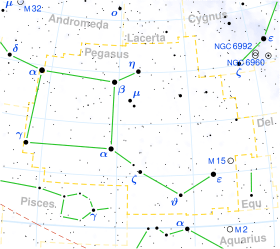Tau Pegasi
Tau Pegasi (τ Pegasi, abbreviated Tau Peg, τ Peg), formally named Salm /ˈsɑːm/[10] (a homophone with the planet Samh), is a 4.6 magnitude star in the constellation of Pegasus.
| Observation data Epoch J2000.0 Equinox J2000.0 | |
|---|---|
| Constellation | Pegasus |
| Right ascension | 23h 20m 38.24188s[1] |
| Declination | +23° 44′ 25.2098″[1] |
| Apparent magnitude (V) | +4.58[2] |
| Characteristics | |
| Spectral type | A5 Vp[3] |
| U−B color index | +0.13[4] |
| B−V color index | +0.17[4] |
| Variable type | δ Sct[5] |
| Astrometry | |
| Radial velocity (Rv) | +15.20 ± 1.6[6] km/s |
| Proper motion (μ) | RA: 29.45 ± 0.33[1] mas/yr Dec.: –9.53 ± 0.27[1] mas/yr |
| Parallax (π) | 20.17 ± 0.40[1] mas |
| Distance | 162 ± 3 ly (49.6 ± 1.0 pc) |
| Absolute magnitude (MV) | 1.10[2] |
| Details | |
| Mass | 2.14[7] M☉ |
| Radius | 2.8[8] R☉ |
| Luminosity | 32[7] L☉ |
| Surface gravity (log g) | 3.88[9] cgs |
| Temperature | 7,709[7] K |
| Metallicity [Fe/H] | -0.28[2] dex |
| Rotational velocity (v sin i) | 149[7] km/s |
| Other designations | |
| Database references | |
| SIMBAD | data |
Nomenclature
τ Pegasi (Latinised to Tau Pegasi) is the star's Bayer designation.
The star bore the traditional names Salm,[11] Kerb (or El Khereb) and Markab (often spelled Markeb[12]), a name shared with Alpha Pegasi, k Puppis and Kappa Velorum.[13] In 2016, the IAU organized a Working Group on Star Names (WGSN)[14] to catalog and standardize proper names for stars. The WGSN approved the name Salm for this star and Markeb for the component Kappa Velorum A, both on 5 September 2017. Markab had previously been approved for Alpha Pegasi on 30 June 2016. All three are now so included in the List of IAU-approved Star Names.[10]
In Chinese, 離宮 (Lì Gōng), meaning Resting Palace, refers to an asterism consisting of Tau Pegasi, Lambda Pegasi, Mu Pegasi, Omicron Pegasi, Eta Pegasi and Nu Pegasi.[15] Consequently, the Chinese name for Tau Pegasi itself is 離宮五 (Lì Gōng wǔ), "the Fifth Star of Resting Palace".[16]
Properties
Tau Pegasi belongs to spectral class A5 Vp,[3] making it an A-type main-sequence star.
This is a Delta Scuti variable star with a pulsation period of 0.94 hours. It is rotating rapidly with a projected rotational velocity of 150 km s−1. Tau Pegasi is radiating nearly 30 times the luminosity of the Sun from its outer atmosphere at an effective temperature of 7,762 K.[17]
References
- van Leeuwen, F. (November 2007), "Validation of the new Hipparcos reduction", Astronomy and Astrophysics, 474 (2): 653–664, arXiv:0708.1752, Bibcode:2007A&A...474..653V, doi:10.1051/0004-6361:20078357
- Anderson, E.; Francis, Ch. (2012). "XHIP: An extended hipparcos compilation". Astronomy Letters. 38 (5): 331. arXiv:1108.4971. Bibcode:2012AstL...38..331A. doi:10.1134/S1063773712050015. Vizier catalog entry
- Hoffleit, D.; Warren, W. H. (1995). "VizieR Online Data Catalog: Bright Star Catalogue, 5th Revised Ed. (Hoffleit+, 1991)". VizieR On-line Data Catalog: V/50. Originally Published in: 1964BS....C......0H. 5050. Bibcode:1995yCat.5050....0H.
- Mermilliod, J. C. (2006). "VizieR Online Data Catalog: Homogeneous Means in the UBV System (Mermilliod 1991)". VizieR On-line Data Catalog: II/168. Originally Published in: Institut d'Astronomie. 2168. Bibcode:2006yCat.2168....0M.Vizier catalog entry
- Samus, N. N.; Durlevich, O. V.; et al. (2009). "VizieR Online Data Catalog: General Catalogue of Variable Stars (Samus+ 2007-2013)". VizieR On-line Data Catalog: B/gcvs. Originally Published in: 2009yCat....102025S. 1. Bibcode:2009yCat....1.2025S.
- Gontcharov, G. A. (2006). "Pulkovo Compilation of Radial Velocities for 35 495 Hipparcos stars in a common system". Astronomy Letters. 32 (11): 759. arXiv:1606.08053. Bibcode:2006AstL...32..759G. doi:10.1134/S1063773706110065.
- Zorec, J.; Royer, F. (2012). "Rotational velocities of A-type stars". Astronomy & Astrophysics. 537: A120. arXiv:1201.2052. Bibcode:2012A&A...537A.120Z. doi:10.1051/0004-6361/201117691. Vizier catalog entry
- Allende Prieto, C.; Lambert, D. L. (1999). "Fundamental parameters of nearby stars from the comparison with evolutionary calculations: Masses, radii and effective temperatures". Astronomy and Astrophysics. 352: 555. arXiv:astro-ph/9911002. Bibcode:1999A&A...352..555A. Vizier catalog entry
- David, Trevor J.; Hillenbrand, Lynne A. (2015). "The Ages of Early-Type Stars: Strömgren Photometric Methods Calibrated, Validated, Tested, and Applied to Hosts and Prospective Hosts of Directly Imaged Exoplanets". The Astrophysical Journal. 804 (2): 146. arXiv:1501.03154. Bibcode:2015ApJ...804..146D. doi:10.1088/0004-637X/804/2/146. Vizier catalog entry
- "Naming Stars". IAU.org. Retrieved 16 December 2017.
- Allen, Richard Hinckley (1899). Star-names and their meanings. New York, Leipzig [etc.] G.E. Stechert. pp. 329.
- Kunitzsch, P. (February 1986), "John of London and his Unknown Arabic Sources", Journal for the History of Astronomy, 17 (1): 51, Bibcode:1986JHA....17...51K
- Kostjuk, N. D. (2004). "VizieR Online Data Catalog: HD-DM-GC-HR-HIP-Bayer-Flamsteed Cross Index (Kostjuk, 2002)". VizieR On-line Data Catalog: IV/27A. Originally Published in: Institute of Astronomy of Russian Academy of Sciences (2002). 4027. Bibcode:2004yCat.4027....0K.
- "IAU Working Group on Star Names (WGSN)". Retrieved 22 May 2016.
- (in Chinese) 中國星座神話, written by 陳久金. Published by 台灣書房出版有限公司, 2005, ISBN 978-986-7332-25-7.
- (in Chinese) 香港太空館 - 研究資源 - 亮星中英對照表 Archived 2008-10-25 at the Wayback Machine, Hong Kong Space Museum. Accessed on line November 23, 2010.
- Balona, L. A.; Dziembowski, W. A. (October 1999), "Excitation and visibility of high-degree modes in stars", Monthly Notices of the Royal Astronomical Society, 309 (1): 221–232, Bibcode:1999MNRAS.309..221B, doi:10.1046/j.1365-8711.1999.02821.x
